Charles E W Bean, Diaries, AWM38 3DRL 606/277/1 - 1926-1939 - Part 7

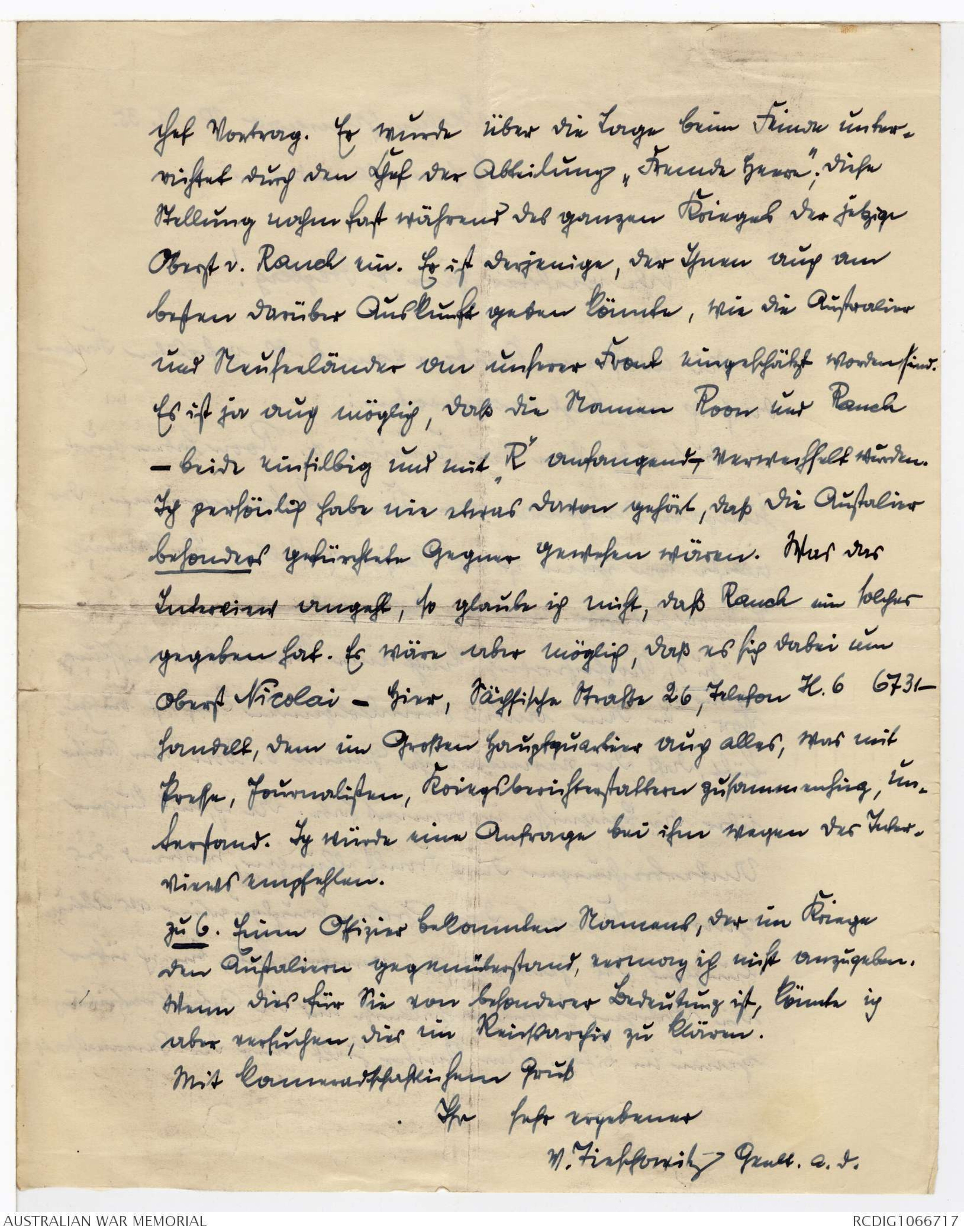
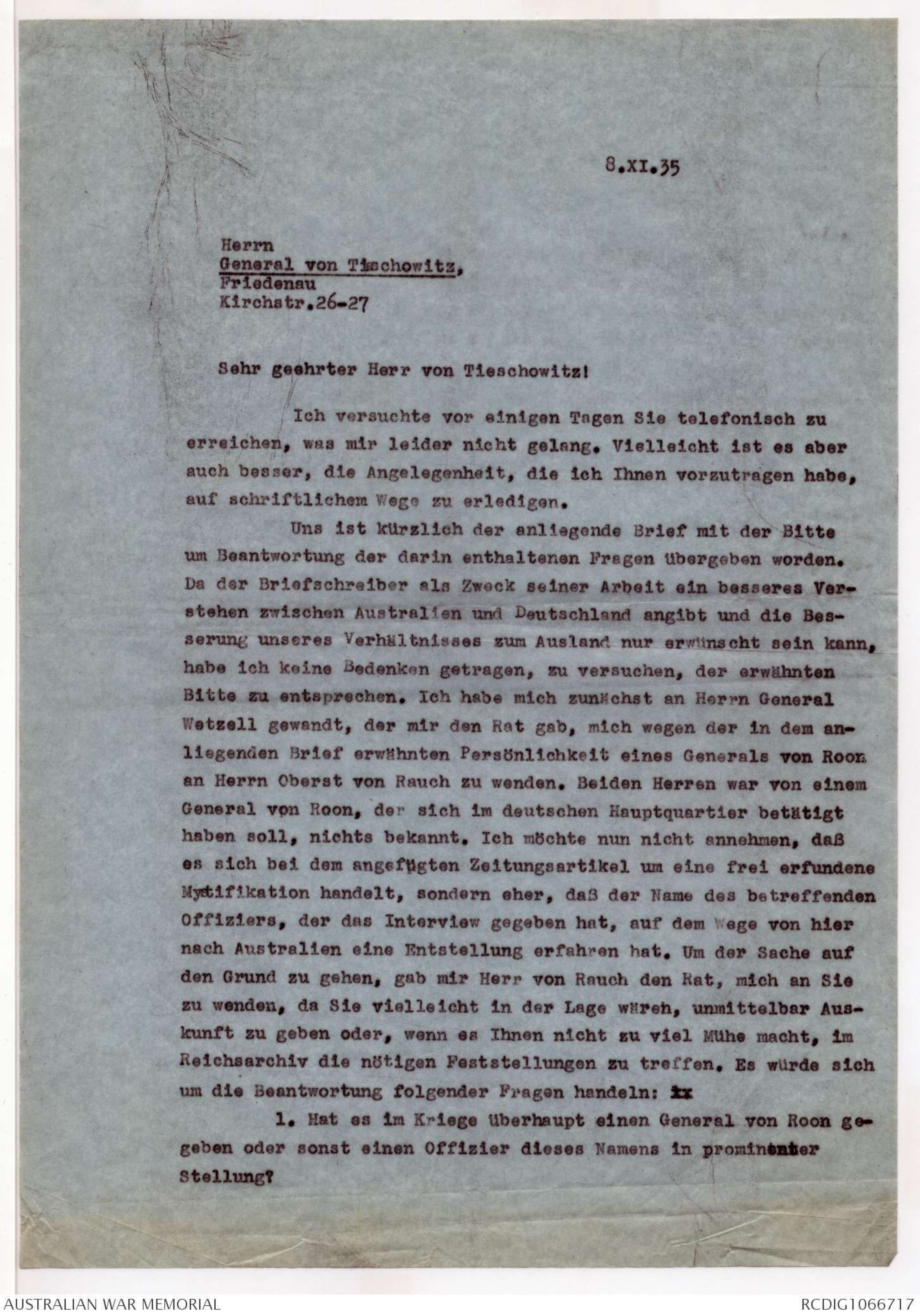
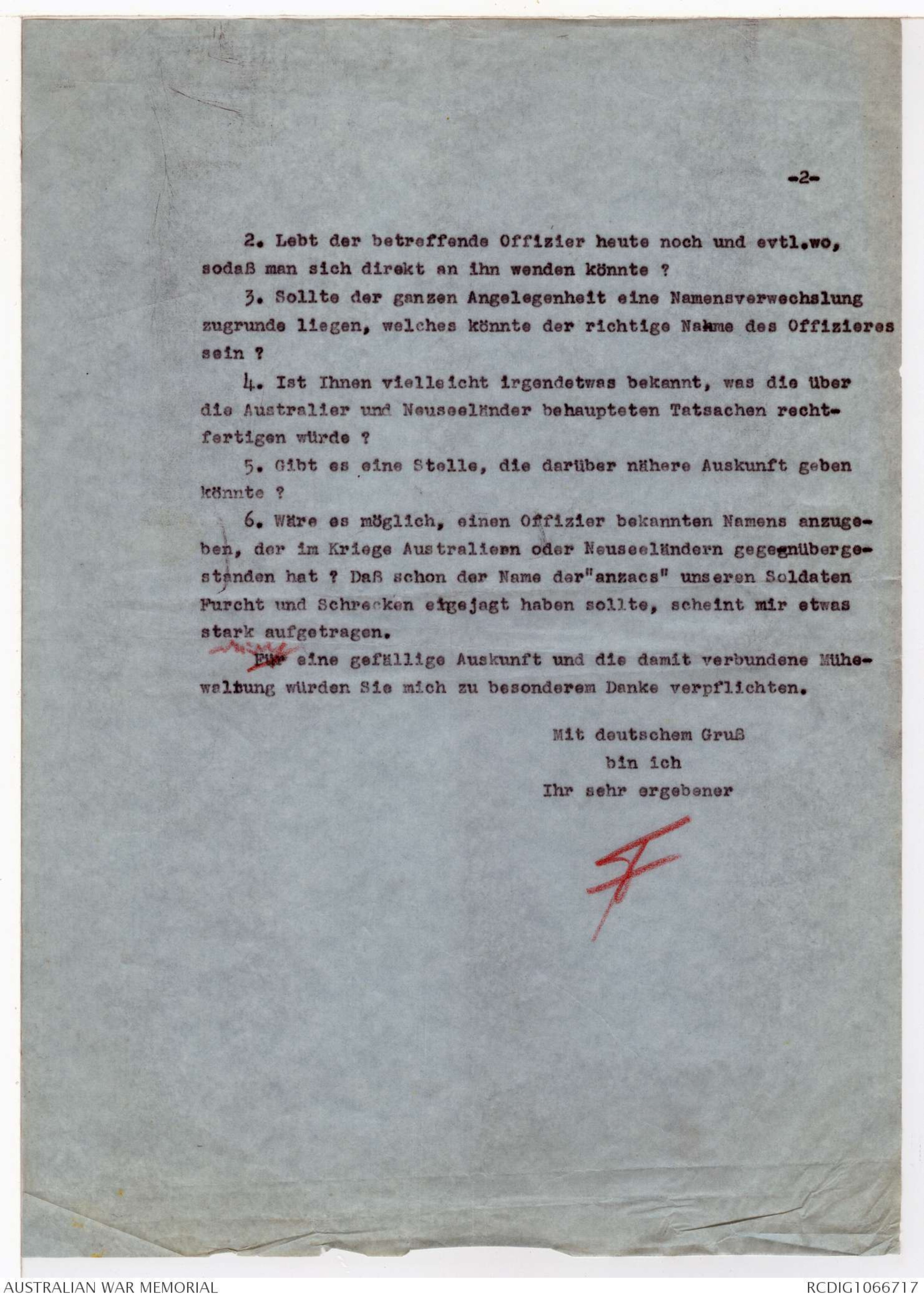
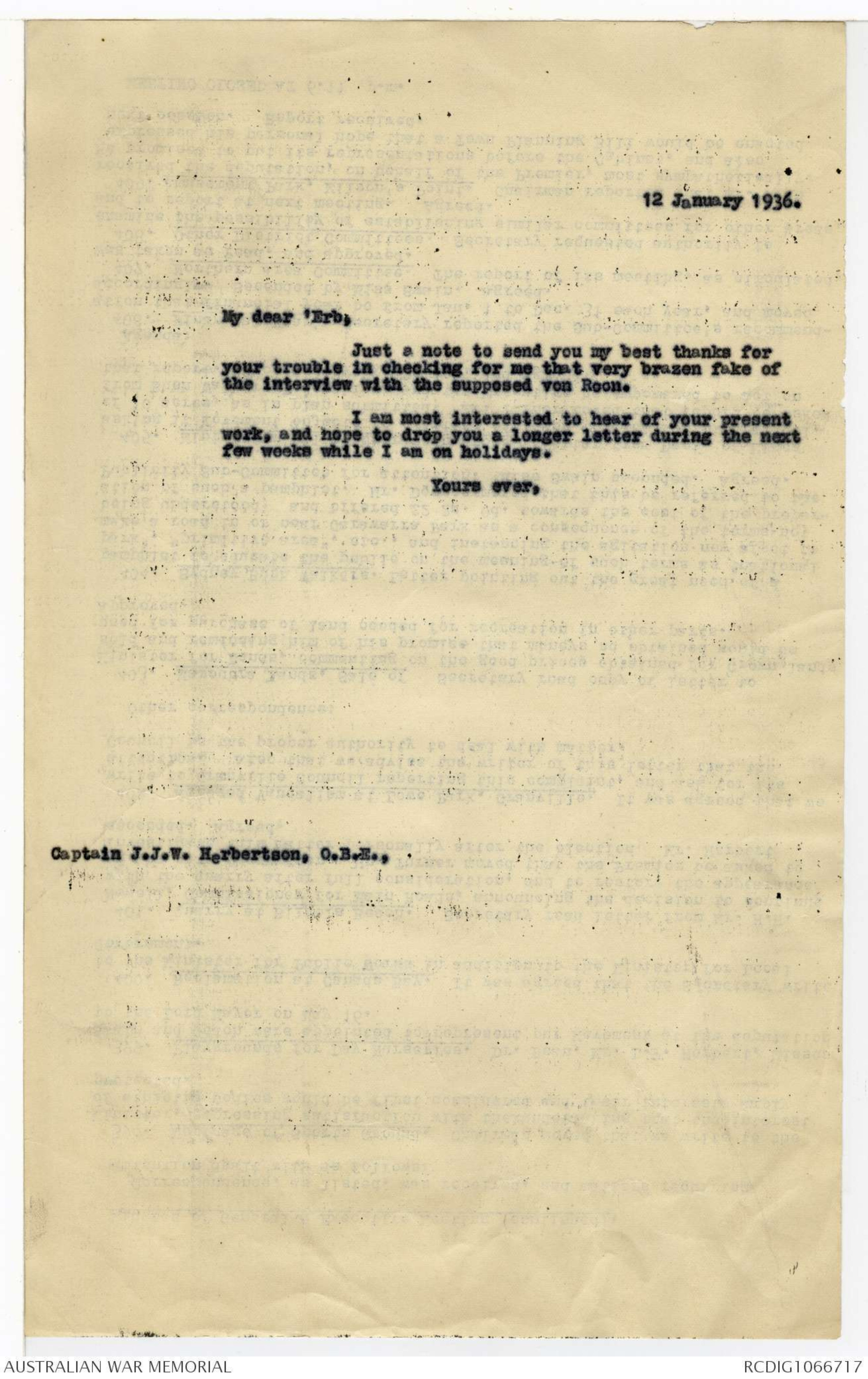
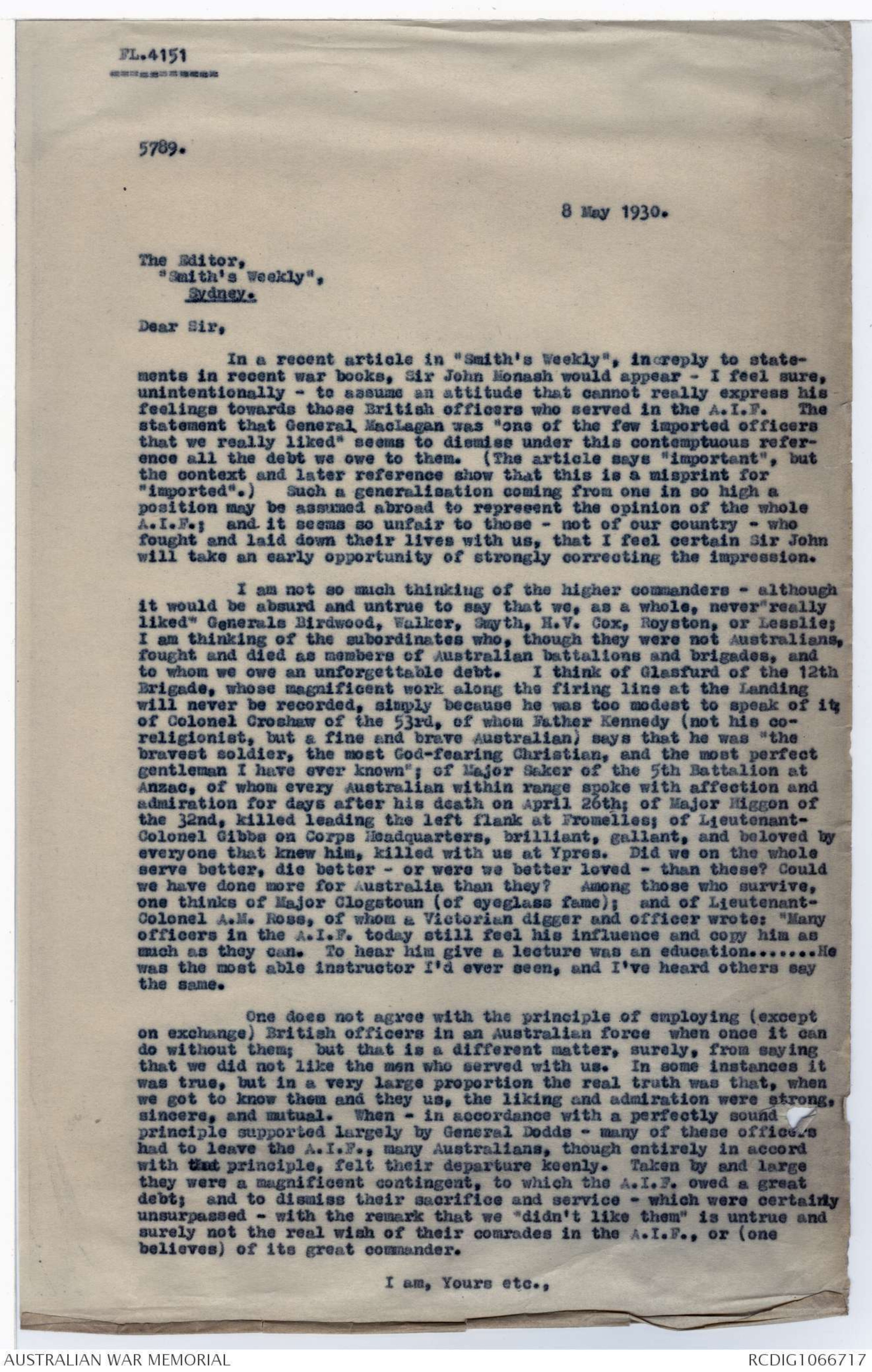
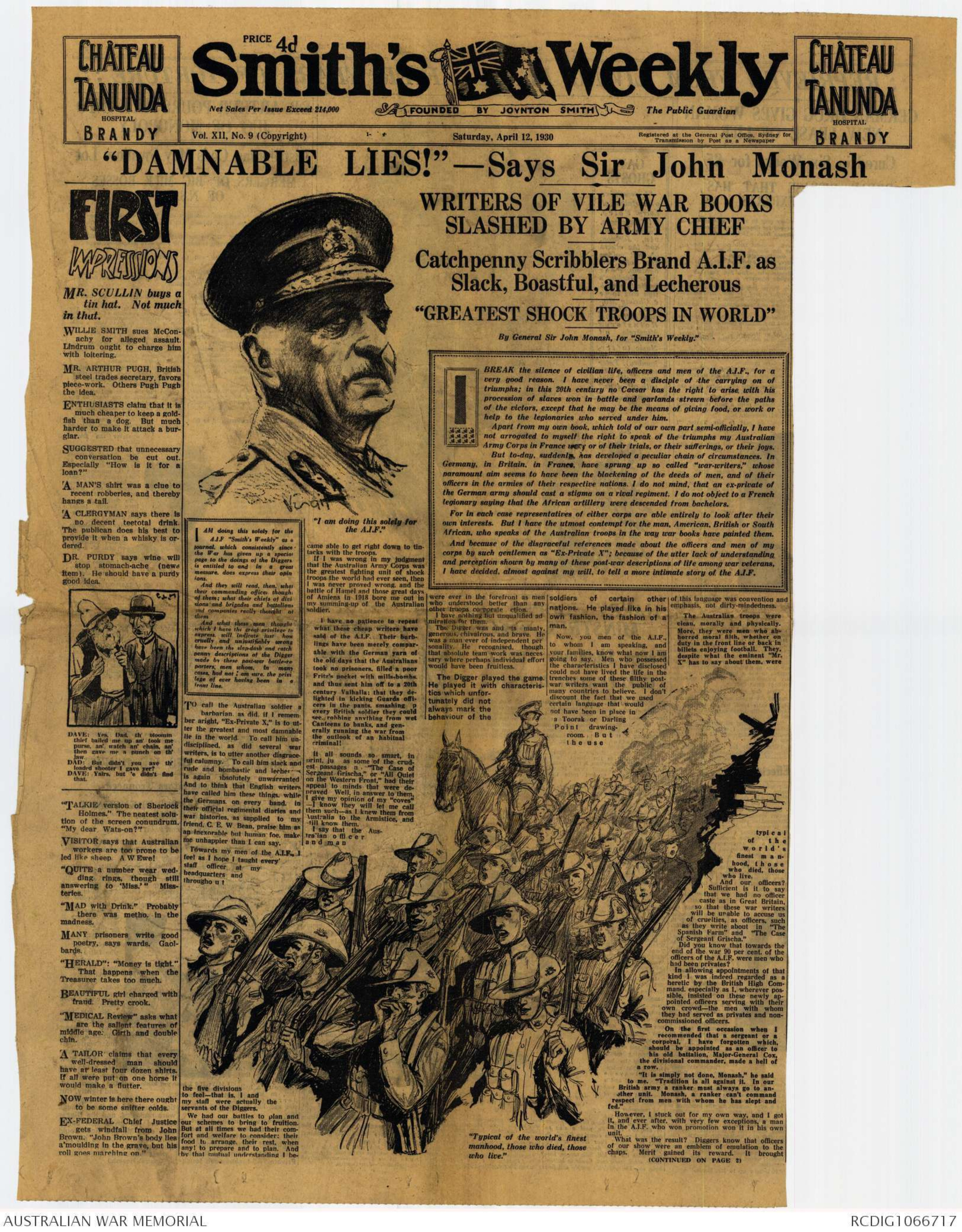
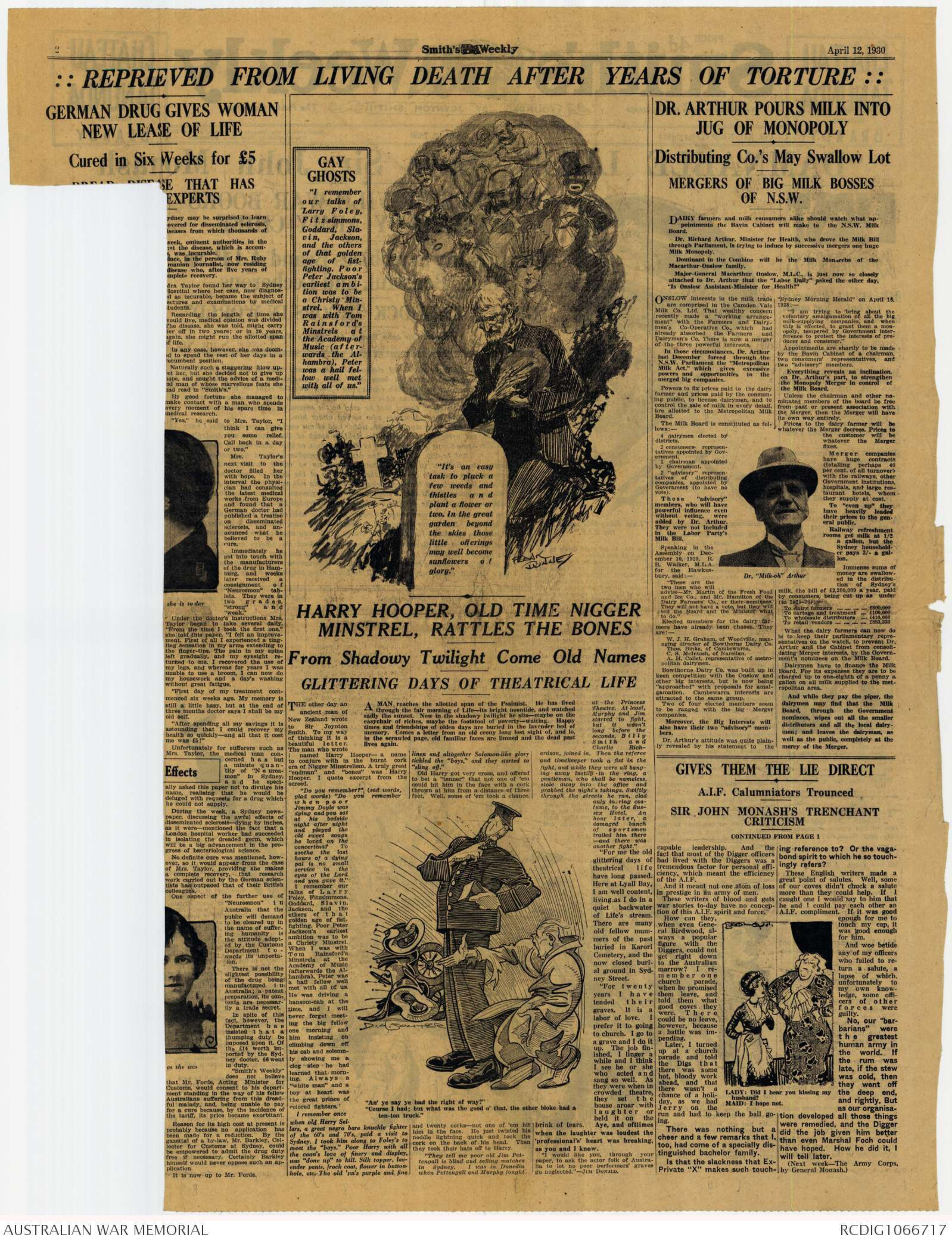
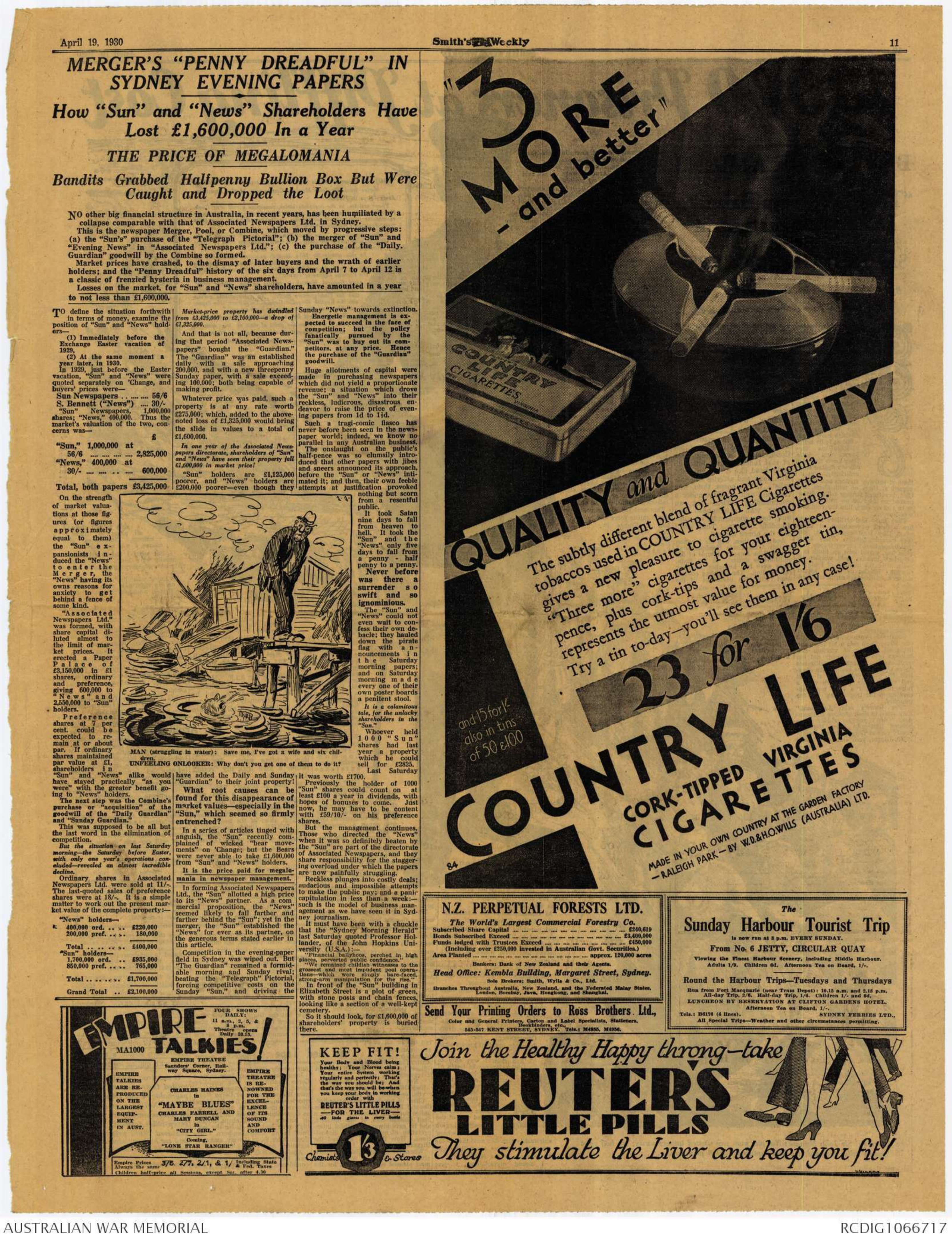
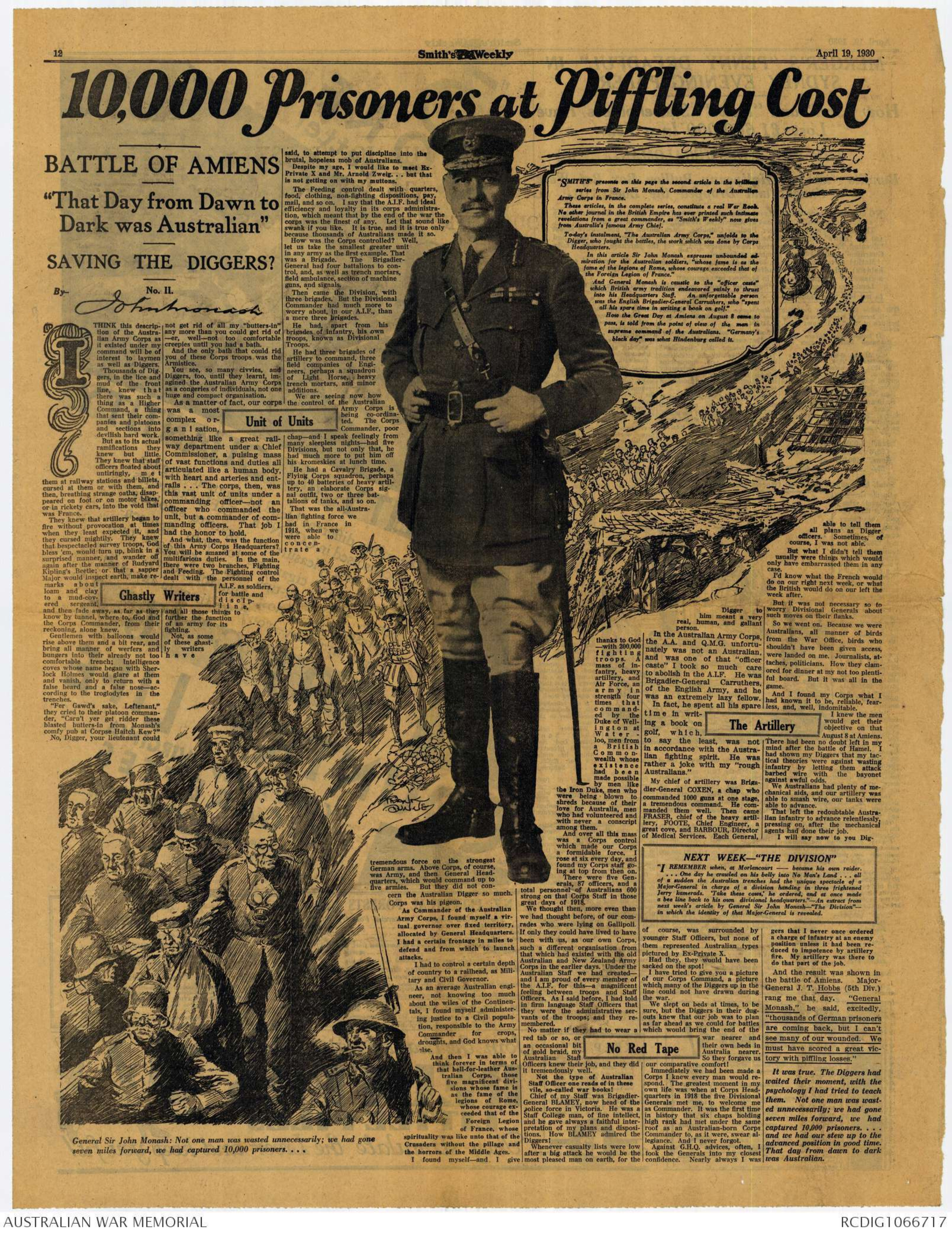
Berlin-Grunewald, 10.11.35.
Hohenzollerndamm 91.
Sehr geehrter Herr v. Freyberg!
Die in freur Preiben vom 8. dv. gefellten Fragen
darf ich wie folgt beantworten:
Zu 1 un. 2 Von der Familie v. Roon haben uur
jüngere Mitglieder am Kriege beilgenommen. Der
älteste von ihnen ist als Major gefallen. Ein General
v. Roon hart gar nicht im Fade gestanden.
Zu 3, 4 und 5. Möglicherweise liegt eine Namerkwechslung
von. Vor dem anbei zurückfolgenden brief ist auffer
ficft, daB der vermeintliche General v. Roon den Kaiser
über die Heignisse informiert habe. Da ich, mit [[?]]
Unterbrechungen dush Frochfellunger, während des
gourgen Kriegel dem Groben [[?]] us altin,
lungsfch des Generealstabes angehört habe, bin ich über
die dortigen Personalverhaltnit und die Arbeitsverteilung
Genau im Bilde. Dem Kaiser hielt uur der Geneachtatt,
[[?]] [[?]]. [[?]] [[?]] über die [[Lorgu?]] Grim [[Fiure?]] [[un?]],
[[?]] [[?]] den [[?]] der Abtielung "[[?]] [[?]]"; [[?]]
[[????????]]
[[?]] v. Rauch die. So ich [[?]], den [[????]]
[[???????]]
[[????????]].
[[??]] möglig, [[?]] Roon und Rauch
- [[?]] und mit "R" [[?????]]
[[?]] wir [[????]], [[?]] die [[?]]
[[?]] [[?????]]. [[?]]
[[??]], [[?]], [[?]] Rauch im [[?]]
[[?????]] möglig, [[????]]
[[?]] Nicolai - Herr, [[?????]] 26, Telefon H.6 6731-
[[?]], [[?]] [[?]] [[?]] [[?]] [[?]] [[?]], [[?]] [[?]]
[[?]], [[?]], [[?]] [[?]], [[?]]
[[?]]. [[?]] [[?]] [[?]] [[?]] [[?]] [[?]] [[?]] [[?]] [[?]]
[[?]] [[?]].
Zu 6. Einen Offizier bekannten Namens, der im Kriege
der Australien gegnübergest, [[?]] [[?]] mich anzugeben.
[[?]] [[?]] für [[?]] [[?]] [[?]] [[?]] [[?]], [[?]] [[?]]
uber [[?]], [[?]] im [[R?]] zur [[?]].
Mit [[?]] [[?]]
Ihr sehr ergebener
W. Tieschowitz [[?]] [[a.d.]]
8.XI.35
Herrn
General von Tieschowitz,
Friedenau
Kirchstr.26-27
Sehr geehrter Herr von Tieschowitz!
Ich versuchte vor einigen Tagen Sie telefonisch zu
erreichen, was mir leider nicht gelang. Vielleicht ist es aber
auch besser, die Angelegenheit, die ich Ihnen vorzutragen habe,
auf schriftlichem Wege zu erledigen.
Uns ist kürzlich der anliegende Brief mit der Bitte
um Beantwortung der darin enthaltenen Fragen übergeben worden.
Da der Briefschreiber als Zweck seiner Arbeit ein besseres Verstehen
zwischen Australien und Deutschland angibt und die Besserung
unseres Verhältnisses zum Ausland nur erwünscht sein kann,
habe ich keine Bedenken getragen, zu versuchen, der erwähnten
Bitte zu entsprechen. Ich habe mich zunächst an Herrn General
Wetzell gewandt, der mir den Rat gab, mich wegen der in dem anliegenden
Brief erwähnten Persönlichkeit eines Generals von Roon
an Herrn Oberst von Rauch zu wenden. Beiden Herren war von einem
General von Roon, der sich im deutschen Hauptquartier betätigt
haben soll, nichts bekannt. Ich möchte nun nicht annehmen, daß
es sich bei dem angefügten Zeitungsartikel um eine frei erfundene
Mystifikation handelt, sondern eher, daß der Name des betreffenden
Offiziers, der das Interview gegeben hat, auf dem wege von hier
nach Australien eine Entstellung erfahren hat. Um der Sache auf
den Grund zu gehen, gab mir Herr von Rauch den Rat, mich an Sie
zu wenden, da Sie vielleicht in der Lage wären, unmittelbar Auskunft
zu geben oder, wenn es Ihnen nicht zu viel Mühe macht, im
Reichsarchiv die nötigen Feststellungen zu treffen. Es würde sich
um die Beantwortung folgender Fragen handeln; xx
1. Hat es im Kriege überhaupt einen General von Roon gegeben
oder sonst einen Offizier dieses Namens in prominenter
Stellung?
-2-
2. Lebt der betreffende Offizier heute noch und evtl.wo,
sodaß man sich direkt an ihn wenden könnte?
3. Sollte der ganzen Angelegenheit eine Namensverwechslung
zugrunde liegen, welches könnte der richtige Nahme des Offizieres
sein?
4. Ist Ihnen vielleicht irgendetwas bekannt, was die über
die Australier and Neuseeländer behaupteten Tatsachen rechtfertigen
wurde?
5. Gibt es eine Stelle, die darüber nähere Auskunft geben
könnte?
6. Wäre es möglich, einen Offizier bekannten Namens anzugeben,
der im Kriege Australienn oder Neuseeländern gegegnübergestanden
hat? Daß schon der Name der"anzacs" unseren Soldaten
Furcht und Schrecken eingejagt haben sollte, scheint mir etwas
stark aufgetragen.Für [[?]] eine gefällige Auskunft und die damit verbundene Mühewaliung
würden Sie mich zu besonderem Danke verpflichten.
Mit deutschem Gruß
bin ich
Ihr sehr ergebener
[[TF?]]
12 January 1936.
My dear 'Erb,
Just a note to send you my best thanks for
your trouble in checking for me that very brazen fake of
the interview with the supposed von Roon.
I am most interested to hear of your present
work, and hope to drop you a longer letter during the next
few weeks while I am on holidays.
Yours ever,
Captain J.J.W. Herbertson, O.B.E.,
FL.4151
5789.
8 May 1930.
The Editor,
"Smith's Weekly",
Sydney.
Dear Sir,
In a recent article in "Smith's Weekly", in reply to statements
in recent war books, Sir John Monash would appear - I feel sure,
unintentionally - to assume an attitude that cannot really express his
feelings towards these British officers who served in the A.I.F. The
statement that General MacLagan was "one of the few imported officers
that we really liked" seems to dismiss under this contemptuous reference
all the debt we owe to them. (The article says "important", but
the context and later reference show that this is a misprint for
"imported".) Such a generalisation coming from one in so high a
position may be assumed abroad to represent the opinion of the whole
A.I.F.; and it seems so unfair to those - not of our country - who
fought and laid down their lives with us, that I feel certain Sir John
will take an early opportunity of strongly correcting the impression.
I am not so much thinking of the higher commanders - although
it would be absurd and untrue to say that we, as a whole, never "really
liked" Generals Birdwood, Walker, Smyth, H.V. Cox, Royston, or Lesslie;
I am thinking of the subordinates who, though they were not Australians,
fought and died as members of Australian battalions and brigades, and
to whom we owe an unforgettable debt. I think of Glasfurd of the 12th
Brigade, whose magnificent work along the firing line at the Landing
will never be recorded, simply because he was too modest to speak of it;
of Colonel Croshaw of the 53rd, of whom Father Kennedy (not his co-religionist, but a fine and brave Australian) says that he was "the
bravest soldier, the most God-fearing Christian, and the most perfect
gentleman I have ever known"; of Major Saker of the 5th Battalion at
Anzac, of whom every Australian within range spoke with affection and
admiration for days after his death on April 26th; of Major Higgon of
the 32nd, killed leading the left flank at Fromelles; of Lieutenant-
Colonel Gibbs on Corps Headquarters, brilliant, gallant, and beloved by
everyone that knew him, killed with us at Ypres. Did we on the whole
serve better, die better - or were we better loved - than these? Could
we have done more for Australia than they? Among those who survive,
one thinks of Major Clogstoun (of eyeglass fame); and of Lieutenant-
Colonel A.M. Ross, of whom a Victorian digger and officer wrote: "Many
officers in the A.I.F. today still feel his influence and copy him as
much as they can. To hear him give a lecture was an education......He
was the most able instructor I'd ever seen, and I've heard others say
the same.
One does not agree with the principle of employing (except
on exchange) British officers in an Australian force when once it can
do without them; but that is a different matter, surely, from saying
that we did not like the men who served with us. In some instances it
was true, but in a very large proportion the real truth was that, when
we got to know them and they us, the liking and admiration were strong,
sincere, and mutual. When - in accordance with a perfectly sound
principle supported largely by General Dodds - many of these officers
had to leave the A.I.F., many Australians, though entirely in accord
with that principle, felt their departure keenly. Taken by and large
they were a magnificent contingent, to which the A.I.F. owed a great
debt; and to dismiss their sacrifice and service - which were certainly
unsurpassed - with the remark that we "didn't like them" is untrue and
surely not the real wish of their comrades in the A.l.F., or (one
believes) of its great commander.
I am, Yours etc.,
Newspaper article - see original document
Smith's Weekly
Vol. XIII, No. 9 (Copyright) Saturday, April 12, 1930
Newspaper article - see original document
2 Smith's Weekly April 12, 1930
Newspaper article - see original document
April 19, 1930 Smith's Weekly 11
Newspaper article - see original document
12 Smith's Weekly April 19, 1930
 Arlene Baade
Arlene BaadeThis transcription item is now locked to you for editing. To release the lock either Save your changes or Cancel.
This lock will be automatically released after 60 minutes of inactivity.